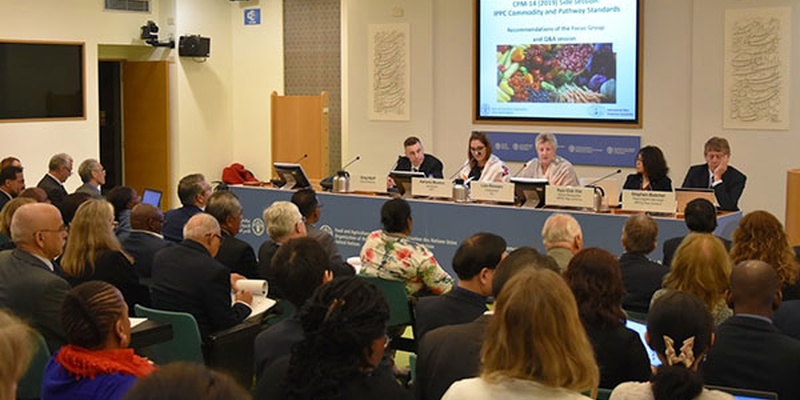IPPC Commodity and pathways standards - side session at CPM-14
Posted on Wed, 17 Apr 2019, 13:37

During the side session, Ms Lois Ransom from Australia explained that with IPPC commodity and pathways standards, the regulation of pests will remain firmly based on pest risk analysis and obligations will not be imposed on importing countries. © FAO
2 April 2019, Rome - The International Plant Protection Convention (IPPC) is the only international organization for plant health recognized by the World Trade Organization s Sanitary and Phytosanitary Agreement (the SPS Agreement). The IPPC safeguards agriculture and facilitates safe trade - which, in turn, support economic growth and development, and reduces poverty around the world.
However, trade can spread plant pests and threaten natural plant resources, managed crops, biodiversity and forest production. Therefore, it is important to facilitate safe trade by preventing plant pests from spreading while avoiding unjustifiable trade barriers. One way of doing this is by developing and adopting commodity-based international standards for phytosanitary measures (ISPMs). Harmonized standards help avoid complex commodity-based import requirements and unnecessary barriers to international trade.
Side session on IPPC commodity and pathways standards
During the Commission on Phytosanitary Measures (CPM-14) session, the IPPC Secretariat organized a side session on IPPC Commodity and pathways standards: Focus group Q&A. The session looked at recommendations made by the Focus Group (FG) on Commodity and Pathways Standards that met in October 2018 and a comprehensive document presented to the CPM-14. Ms Adriana G. Moreira, IPPC Standards Officer, encouraged participants to discuss how to move forward with the development of these standards - including their principles and ground rules.
Characteristics and advantages of IPPC commodity and pathways standards
Ms Lois Ransom, Chairperson of the FG, CPM Bureau member, and Assistant Secretary of the Australian Government Department of Agriculture and Water Resources, highlighted that with IPPC commodity and pathways standards, the regulation of pests will remain firmly based on pest risk analysis and obligations will not be imposed on importing countries.
Mr Greg Wolff, Rapporteur of the FG and CPM Bureau member and Director of the Plant Import and Export Division in the Canadian Food Inspection Agency s International Affairs Branch, underscored that these standards will help to expedite market access negotiations, enhance phytosanitary security and achieve several strategic goals of the IPPC and FAO.
The Focus Group recognized that these standards will harmonize phytosanitary measures, promote the equivalency of measures and optimize resources by avoiding the duplication of requirements. They may support developing countries by helping them effectively manage risks and introducing new international trade opportunities.
Regional experiences with commodity standards
Mr Stephen Butcher, member of the IPPC Standards Committee and Chief Technical Officer from New Zealand, and Ms Kyu-Ock Yim, former CPM Chairperson and chief researcher at the Ministry of Agriculture, Food and Rural Affairs from the Rep. of Korea, shared their experiences in developing standards for mango fruits and chili seeds in their region and the Asia and Pacific Plant Protection Commission (APPPC).
They pointed out that high quality, accurate and reliable information about pests associated with the entire production cycle, and the risks associated with these commodities, were fundamental for developing the standards. Therefore, international collaboration is crucial for developing and implementing these standards.
Several IPPC commodity and pathway standards already exist
The IPPC has already adopted several commodity and pathways standards such as the ISPM 15 for wood packaging material and ISPM 38 on the international movement of seeds. Commodity and pathways standards are included in the IPPC Strategic Framework for 2020-2030 as a developmental goal, and have now become a priority for the Convention.
New approaches to pest risk management
The FG has proposed that pest risk management options for major regulated pests associated with a commodity or a pathway will be identified and endorsed for global use. Countries will retain their sovereign right to set the conditions for the safe import of goods. They will remain free to negotiate measures for pests of concern not adequately covered by a specific standard.
A second meeting of the focus group will be held in June 2019. A conceptual or over-arching draft standard; and recommendations for revising the governance structure for developing IPPC commodities and pathways standards will be proposed to CPM-15 (March 2020) for endorsement.
For further information, please contact Ms Adriana G. Moreira, IPPC Standards Officer at [email protected]

